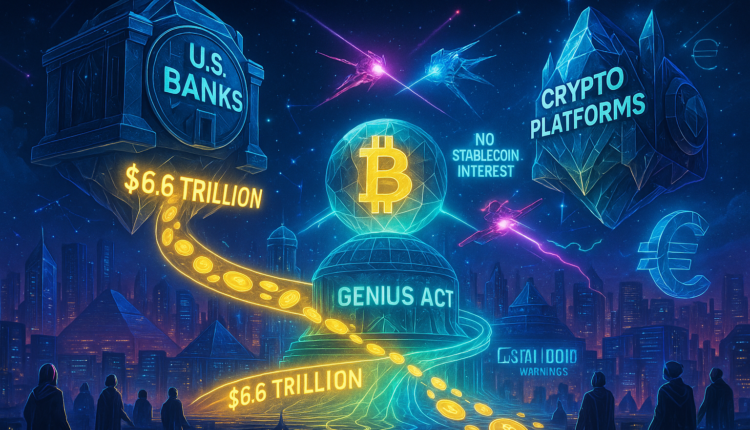U.S. Banks Warn $6.6T Deposit Outflow Looms Under Stablecoin Law

American banks are pushing back against the newly enacted GENIUS Act, warning that the law could accelerate a massive $6.6 trillion shift of deposits into crypto platforms. The controversial stablecoin provisions have reignited debate over financial stability and regulatory balance.
The passage of the GENIUS Act is sparking fierce resistance from U.S. banks, which argue that the legislation could fundamentally reshape the balance of deposits between traditional finance and digital assets. Central to their concerns is a provision that bans interest payments on stablecoin holdings, a rule designed to reduce systemic risks and prevent stablecoins from competing directly with bank deposits.
Critics, however, contend that the restrictions may backfire. Crypto exchanges and fintech platforms are already exploring ways to circumvent the interest ban by structuring yield programs through third-party arrangements. Such strategies could attract massive inflows of customer deposits away from banks, creating what some industry groups are calling an “unbalanced playing field.”
Online advertising service 1lx.online
Analysts estimate the potential stakes could reach as high as $6.6 trillion in deposit outflows, a figure that underscores just how disruptive the GENIUS Act may become for the U.S. financial system. Bank lobbyists argue that such a shift could destabilize core banking activities like lending and credit provision, while giving crypto-native firms a regulatory advantage.
The backlash has already begun to ripple through global policy debates. In Europe, regulators are reportedly reviewing their digital euro strategy, with some lawmakers warning that U.S. policy decisions may have unintended global spillovers. Calls for a reexamination of stablecoin oversight frameworks are growing louder on both sides of the Atlantic.
Supporters of the GENIUS Act counter that stricter rules on stablecoins are necessary to ensure long-term financial stability. They argue that stablecoins should not be allowed to function as shadow banks offering quasi-deposit accounts with little oversight. Still, the lobbying offensive by banks reflects a deepening divide over the future of money, trust, and competition between traditional institutions and the emerging crypto economy.
As regulators weigh the next steps, the confrontation highlights a broader reality: digital assets are no longer a fringe issue. They now sit at the heart of monetary policy, capital flows, and the tug-of-war between innovation and systemic risk.
Our creator. creates amazing NFT collections!
Support the editors - Bitcoin_Man (ETH) / Bitcoin_Man (TON)
Pi Network (Guide)is a new digital currency developed by Stanford PhDs with over 55 million participants worldwide. To get your Pi, follow this link https://minepi.com/Tsybko and use my username (Tsybko) as the invite code.
Binance: Use this link to sign up and get $100 free and 10% off your first months Binance Futures fees (Terms and Conditions).
Bitget: Use this link Use the Rewards Center and win up to 5027 USDT!(Review)
Bybit: Use this link (all possible discounts on commissions and bonuses up to $30,030 included) If you register through the application, then at the time of registration simply enter in the reference: WB8XZ4 - (manual)
